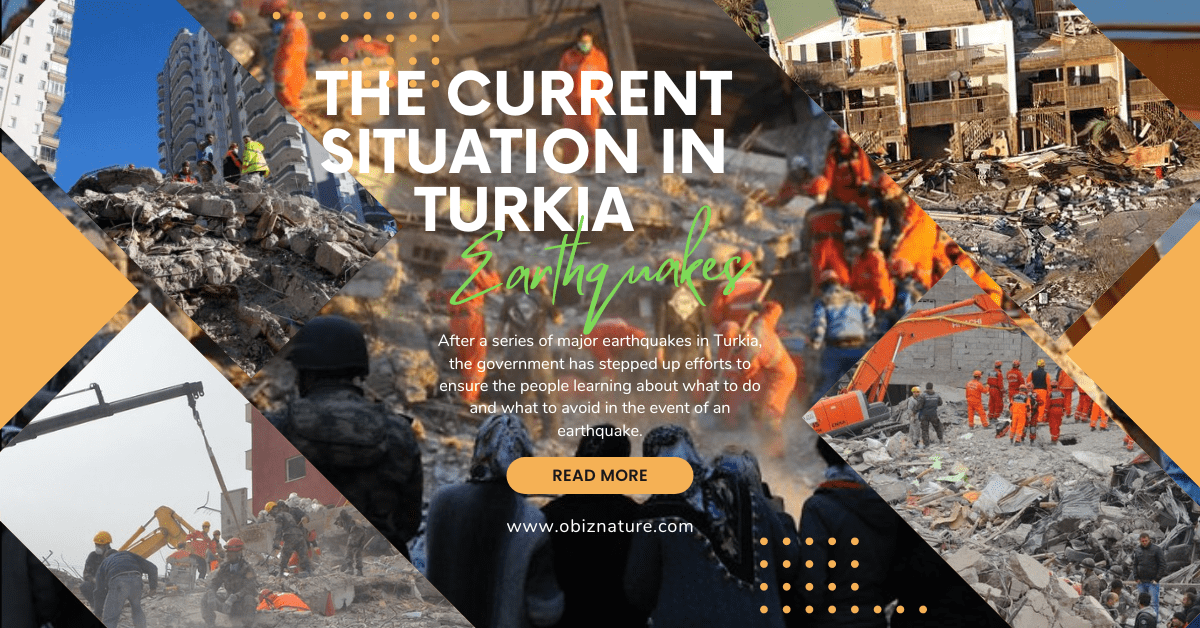The Current Situation In Turkey After Earthquakes

Introduction
Earthquakes are natural disasters that can have devastating effects on human life and property. The countries that lie along the tectonic plates are the most vulnerable to earthquakes. Turkey and Syria are located in an active earthquake zone, and they have experienced several major earthquakes in the past few years. In this article, we will discuss the current situation in Turkey and Syria after the earthquakes, the impact on the healthcare system, and the famous tourist destinations affected by earthquakes.
Background information on Turkey and Syria
Turkey is a transcontinental country located in both Europe and Asia. It is the 37th largest country in the world by area, and it has a population of about 83 million people. Turkey is a secular, unitary, parliamentary republic, and it has a diverse cultural heritage. Syria is a country located in Western Asia, bordering Lebanon, Israel, Jordan, Iraq, and Turkey. It has a population of about 18 million people and has been in a state of civil war since 2011.
Earthquakes in Turkey and Syria
Turkey and Syria are both located in an active earthquake zone. In the past few years, both countries have experienced several major earthquakes. In 2011, a 7.2 magnitude earthquake struck eastern Turkey, killing over 600 people and injuring thousands. In 2016, a series of earthquakes struck western Turkey, killing over 500 people and injuring thousands. In 2019, a 6.8 magnitude earthquake struck eastern Turkey, killing over 40 people and injuring hundreds.




In Turkey’s earthquake-stricken districts, about 240,000 rescuers are still at work, but no survivors have been discovered recently.
A 7.7 magnitude earthquake struck southeastern Turkey and northern Syria on February 6; a 7.6 magnitude earthquake struck a short while afterward. Since then, the area has experienced almost 9,000 aftershocks, according to the AFAD.
In the 11 regions of Turkey affected by the earthquake, there are still close to 240,000 rescuers working, including volunteers. Although it was originally challenging to reach some of the damaged areas, recovery activities are still ongoing, and the number of casualties is increasing.
There hasn’t been any recent news of survivors being saved.
Syria has also experienced several major earthquakes in the past. In 2018, a 6.2 magnitude earthquake struck the Syria-Iraq border region, killing over 500 people and injuring thousands. In 2020, a 5.7 magnitude earthquake struck northern Syria, causing several casualties and extensive damage.
The Current Situation in Turkey after Earthquakes
Number of dead from earthquakes
After the 2016 Great Turkish Quake, over 500 people lost their lives, and thousands were injured. In 2019, a 6.8 magnitude earthquake struck eastern Turkey, killing over 40 people and injuring hundreds. The number of casualties was relatively low compared to the 2016 earthquake, which can be attributed to the measures taken by the government and the people. The healthcare system was able to quickly respond and help those in need.
According to Turkey’s Disaster and Emergency Management Authority (AFAD), 44,218 people perished in Turkey alone as a result of the earthquakes, while Syria’s most recent death toll stood at 5,914.
Number of destroyed buildings
The number of destroyed buildings after the 2016 Turkish earthquakes are still high, with over 600 across the country. This number does not include those that were reduced to rubble or those that were modified by the earthquakes. Many of these buildings were in poor condition and lacked water and electricity for years before being used as construction materials. Homeowners need to look into fixing any issues that came with their home before they rent it out.
The Turkish government reports that 173,000 buildings have so far been recorded as collapsing or being severely damaged and that nearly 530,000 people have been evacuated from the disaster area in Turkey alone. More than 1.9 million people have sought refuge in hotels and other public facilities as well as temporary shelters.
The United Nations estimates that 8.8 million people in Syria have been affected by the earthquake, compared to almost 20 million people in Turkey. Syria, where many people were already living in perilous conditions as a result of years of civil war, has provided less information.
Many survivors have either left the earthquake-damaged regions of southern Turkey or have relocated to tent cities, shipping container dwellings, or other government-sponsored housing.
How to help victims of earthquakes
After a major earthquake, there are many questions people in Turkey need to ask themselves. How can you help? What should you do? Many people are afraid to go on the roads after an earthquake, so they bring supplies with them.
How the Government is Helping
The government in Turkia is working to prepare citizens for earthquakes and to help them recover after a disaster. They have put in place several programs to assist the population in times of need.




For example, the government offers training sessions on earthquake preparedness to teach people how to react in the event of an earthquake. These sessions are available to the public and are free of charge. They also provide evacuation drills and training grounds to teach people how to use different types of emergency equipment.
The government also provides financial assistance to those who have been affected by earthquakes. This includes compensation for lost property, medical expenses, and other damages. They also provide funds for rebuilding and rehabilitation of damaged infrastructure.
Recep Tayyip Erdogan, the president of Turkey, has promised to reconstruct homes within a year, despite the fact that experts have advised authorities to prioritize safety over expediency.
From the city of Kahramanmaras, which was the epicenter of the earthquakes, Hashem Ahelbarra of Al Jazeera reported, “The government claimed they will lay down the new foundations of the new houses to be rebuilt by March, and that one year from now they will deliver the new buildings to the inhabitants.”
Overall, the government’s response to earthquakes in Turkia has been swift and effective, helping to minimize the impact of these disasters on the population. However, there is still much work to be done to further improve preparedness and resilience.
Impact on the healthcare system:
Earthquakes can have a significant impact on the healthcare system of affected regions. Hospitals and medical facilities may be damaged or destroyed, making it difficult to provide adequate medical care to those in need. The availability of medical supplies and equipment may also be limited, and healthcare professionals may be overwhelmed by the number of patients requiring treatment.
In addition, earthquakes can lead to the displacement of large numbers of people, creating additional challenges for healthcare providers. Displaced populations may have limited access to medical care, and may be more susceptible to diseases and other health issues due to living in crowded conditions with poor sanitation.
To address these challenges, emergency medical teams and disaster relief organizations are often deployed to affected areas. These teams work to provide medical care to those in need and to help restore damaged healthcare facilities.
Famous tourist destinations affected by earthquakes:
Earthquakes can have a significant impact on famous tourist destinations, both in terms of physical damage and the disruption of tourism activities. Historic buildings, monuments, and other tourist attractions may be damaged or destroyed, leading to a loss of cultural heritage and identity.
In addition, earthquakes can disrupt tourism activities, such as the cancellation of flights and hotel reservations, and the closure of tourist attractions. This can have a significant economic impact on local communities that rely on tourism as a major source of income.



Best Travel destinations around the world
Some famous tourist destinations that have been affected by earthquakes in the past include the ancient city of Pompeii in Italy, which was destroyed by the eruption of Mount Vesuvius in 79 AD, and the city of Christchurch in New Zealand, which was severely damaged by earthquakes in 2010 and 2011.
To mitigate the impact of earthquakes on tourist destinations, many governments and tourism organizations have implemented measures to improve infrastructure and emergency response systems and to promote tourism diversification to reduce dependence on a single attraction or destination.
Conclusion
The earthquakes that have struck Turkia in recent years have highlighted the importance of being prepared for disasters. Through training, education, and awareness, people can learn how to protect themselves and others in the event of an earthquake.
While the earthquakes have caused significant damage and loss of life, the resilience and determination of the Turkian people have shone through. The government’s response has been effective in providing assistance and support to those affected, but there is still much work to be done to ensure that the population is fully prepared for future disasters.
FAQs:
- What causes earthquakes?
Earthquakes are caused by a sudden release of energy in the Earth’s crust. This energy can be released by movement along faults, volcanic activity, or other geological processes.
- How can I prepare for an earthquake?
To prepare for an earthquake, you should have an emergency plan in place and stock up on essential supplies. You should also be aware of the potential risks in your area and how to react in the event of an earthquake.
- Can earthquakes be predicted?
While scientists can detect seismic activity and predict the likelihood of an earthquake, it is not currently possible to predict the exact time, location, or magnitude of an earthquake.
- What should I do during an earthquake?
During an earthquake, you should stay calm and seek shelter under a sturdy piece of furniture or in a doorway. If you are outdoors, move away from buildings and other structures. If you are driving, stop the car and stay inside until the shaking stops.
- How long does it take to recover from an earthquake?
The time it takes to recover from an earthquake depends on the severity of the quake and the level of damage it causes. Recovery can take weeks, months, or even years, and often involves rebuilding damaged infrastructure and providing support to those affected.


Wow, marvelous blog structure! How lengthy have you been blogging for?
you made blogging glance easy. The full glance of your site is wonderful, let alone the
content!
Hello to all, it’s really a fastidious for me to pay a quick visit this
web site, it includes priceless Information.
When I originally commented I clicked the “Notify me when new comments are added” checkbox and now each time a comment is
added I get several e-mails with the same comment. Is there any way you can remove
people from that service? Cheers!
Although I naturally enjoy your website, I would like to point out that you need to check the spelling of a few of your postings. There are a number of them that are riddled with spelling errors, and to tell you the truth, I find it really annoying. On the other hand, I will definitely come back again in the soon future.
How charming! You’ve created an absolutely amazing post here. I sincerely appreciate you sharing these details.
It was great seeing how much work you put into it. The picture is nice, and your writing style is stylish, but you seem to be worrying that you should be presenting the next article. I’ll almost certainly be back to read more of your work if you take care of this hike.